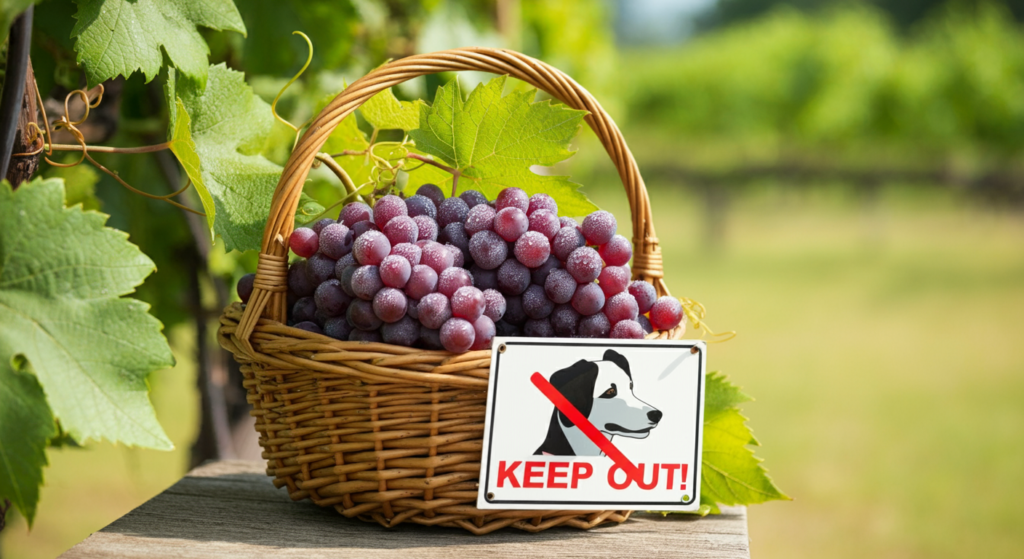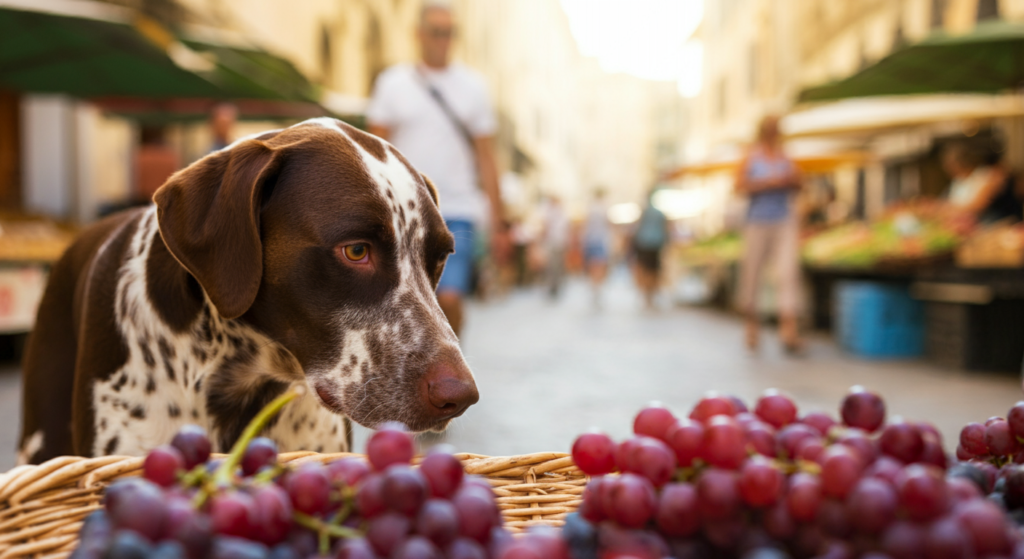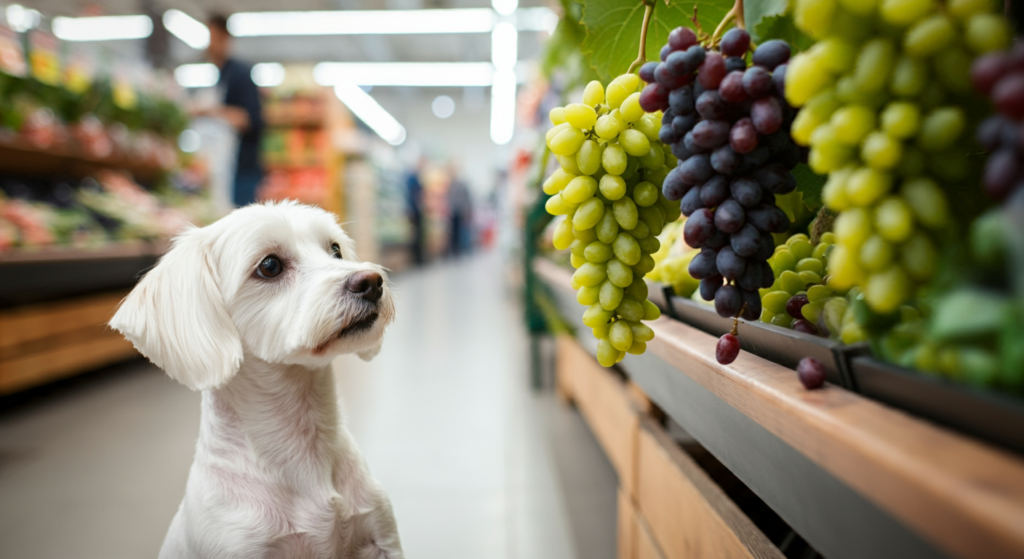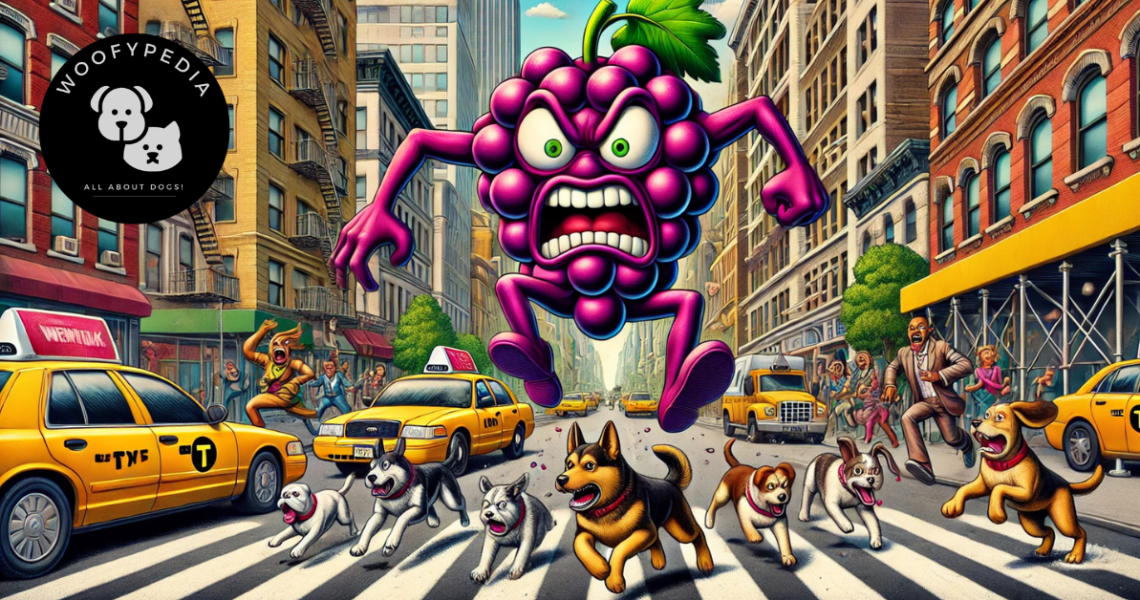Can dogs eat Grapes?
Can Dogs Eat Grapes? A guide to your dog’s safety.
Grapes are a staple in many households, enjoyed for their sweetness and health benefits for humans. However, for dog owners, it’s crucial to recognise that what is healthy for us can be harmful—even deadly—for our pets. Grapes, along with their dried counterpart raisins, are highly toxic to dogs, posing serious health risks that many pet owners may not realise.
No, dogs should never eat grapes. Even a small amount of grapes or raisins can lead to severe health issues, including acute kidney failure, which can be fatal if not treated promptly. The exact toxin responsible for this reaction is still unknown, making it even more critical to avoid feeding grapes to your dog under any circumstances.
Overview
In this article, we will delve into the dangers of grapes for dogs, explain the symptoms of grape toxicity, and provide a step-by-step guide on what to do if your dog consumes grapes. We’ll also discuss preventive measures, the types of foods that may contain hidden grape ingredients, and alternative treats to keep your furry friend happy and healthy. By the end, you’ll be equipped with the knowledge to protect your pet from this common household hazard.
Table of Contents
- Can Dogs Eat Grapes? A guide to your dog’s safety.
- Can dogs eat grapes?
- Are Grapes Bad for Dogs?
- Are Grapes Poisonous to Dogs?
- The Best Lifetime Dog Insurance
- Why Are Grapes Bad for Dogs?
- What Types of Grapes Are Dangerous to Dogs?
- Foods That Contain Grapes
- How Long After Eating Grapes Will a Dog Become Sick?
- Symptoms of Grape Poisoning in Dogs
- When to Contact Your Vet for Advice
- Can a Single Grape Kill a Dog?
- My Dog Ate a Grape, What Should I Do?
- My Dog Ate a Grape but Seems Fine, What Should I Do?
- How to Prevent Your Dog from Being Poisoned
- My Dog Eats Grapes All the Time, Should I Stop Feeding Them?
- Additional Considerations
- What to Do if Your Dog Eats Grapes
- Puppy Nutrition
- FAQs Section
- Conclusion
- Appendix: Nutritional and RDA Table

Can dogs eat grapes?
The answer is a resounding no—dogs should never eat grapes. Grapes and raisins are toxic to dogs and can cause severe health issues, including acute kidney failure, which can lead to death if left untreated.
Although the exact substance responsible for this toxicity is unknown, veterinary studies consistently confirm the risks associated with grape ingestion. Research highlights that toxicity does not depend on the size or breed of the dog, meaning any dog is at risk. The smallest amount of grapes or raisins can be harmful, making it essential to avoid them altogether.
Are Grapes Bad for Dogs?
Yes, grapes are not only bad for dogs but potentially life-threatening. Even a single grape or raisin can cause adverse reactions in some dogs, while others might appear unaffected until more serious symptoms develop. This unpredictability makes it impossible to determine a “safe” amount.
The risks are compounded by the fact that the symptoms of grape toxicity often develop slowly, leading to delayed treatment. Prevention is the best approach when it comes to protecting your pet.
Are Grapes Poisonous to Dogs?
Grapes are not just bad for dogs—they are outright poisonous. Consuming grapes can lead to:
- Vomiting and diarrhoea within hours of ingestion.
- Lethargy, dehydration, and appetite loss as symptoms progress.
- Acute kidney failure, the most serious consequence, which may cause decreased or no urination, abdominal pain, and eventual collapse.
The unique toxic effects of grapes stem from their ability to severely damage the kidneys, though the specific toxin remains unidentified. This makes grapes especially dangerous and emphasises the need to avoid them completely.
The Best Lifetime Dog Insurance
Dealing with emergencies like grape poisoning can be stressful and expensive. Having lifetime pet insurance ensures that your dog can receive immediate treatment without financial hesitation.
When choosing a policy, look for:
- Coverage for poisoning and toxic ingestion.
- Emergency vet visit reimbursement.
- Long-term care costs for complications, such as kidney damage.
Lifetime insurance not only provides peace of mind but also ensures you can focus on your dog’s recovery without worrying about costs.
Why Are Grapes Bad for Dogs?
The exact reason why grapes are toxic to dogs remains unknown, but there are several theories:
- Unknown toxin: Grapes contain a substance (still unidentified) that some believe interacts with a dog’s metabolism to cause kidney failure.
- Fungal contamination: Some researchers suggest that moulds or fungi on grapes may play a role.
- Individual sensitivity: Some dogs seem more predisposed to the toxic effects than others.
Regardless of the specific cause, the dangers are real and well-documented. The lack of conclusive research only strengthens the need for caution, as even small amounts can result in severe consequences. Always err on the side of safety and keep grapes away from your dog.
What Types of Grapes Are Dangerous to Dogs?
Grapes in all their forms are harmful to dogs, and no variety or preparation is safe. Here are the most dangerous types to watch out for:
- Fresh grapes: This includes all colours and varieties, from green to red and black.
- Raisins and dried grape products: These are even more concentrated in their potential toxicity compared to fresh grapes.
- Grape juice, wine, and foods containing grapes: Even small amounts in processed forms can pose a risk. Always check the ingredient list of any food you share with your dog.
Foods That Contain Grapes
Grapes and raisins can be hidden in many common foods, making them a surprising threat. Examples include:
- Trail mixes that often contain raisins.
- Cereal bars with dried fruits.
- Fruit cakes and other baked goods like muffins or cookies.
- Packaged snacks marketed as healthy or energy-boosting options.
It’s essential to read ingredient labels carefully before offering any human food to your dog. Better yet, stick to dog-specific treats to ensure their safety.
How Long After Eating Grapes Will a Dog Become Sick?
The symptoms of grape toxicity can appear at different times, making it essential to monitor your dog closely:
- Early signs (within hours): Vomiting and diarrhoea are usually the first symptoms to develop.
- Delayed signs (12–24 hours): Lethargy, loss of appetite, and dehydration may follow as the kidneys begin to be affected.
- Severe symptoms (24–48 hours): These include signs of kidney failure, such as reduced or absent urination, abdominal pain, and collapse.
Prompt veterinary attention is critical to mitigating these effects and preventing long-term damage.

Symptoms of Grape Poisoning in Dogs
If your dog has consumed grapes, watch for these signs of toxicity:
- Vomiting and diarrhoea as initial indicators.
- Lethargy or weakness due to systemic effects.
- Loss of appetite as the condition progresses.
- Increased thirst or reduced urination, which are signs of kidney trouble.
- Abdominal pain or discomfort.
These symptoms can escalate quickly, so it’s vital to act as soon as you suspect grape ingestion.
When to Contact Your Vet for Advice
If your dog has eaten grapes or raisins, contact your vet immediately, even if no symptoms are present. Acting quickly can save your dog’s life.
- Be ready to provide specific details, such as your dog’s size, age, and the amount consumed.
- Follow your vet’s instructions, which may include inducing vomiting (only under their guidance) or rushing your dog to the clinic.
- Take note of these emergency symptoms: persistent vomiting, difficulty urinating, and signs of lethargy or collapse—these warrant immediate veterinary attention.
When in doubt, it’s always better to err on the side of caution. Time is critical when dealing with grape toxicity.
Can a Single Grape Kill a Dog?
For some dogs, even a single grape can be fatal. The toxicity of grapes varies between individual dogs and depends on factors such as:
- Size: Smaller dogs are at higher risk due to their lower body weight.
- Age: Puppies and senior dogs may be more vulnerable to the effects.
- Genetics: Some dogs may have a predisposition to grape toxicity, though the exact mechanism remains unknown.
Because of this variability, it’s impossible to predict whether a single grape will cause harm. To be safe, always treat grape ingestion as an emergency.
My Dog Ate a Grape, What Should I Do?
If your dog has eaten a grape, follow these steps immediately:
- Contact your vet: Call your veterinarian or an emergency pet poison hotline without delay.
- Do not attempt home remedies: Avoid inducing vomiting or giving any treatments unless explicitly instructed by a vet.
- Bring evidence to the vet: If possible, take any remaining grapes, raisin packaging, or other relevant items with you to help your vet assess the situation.
- Follow veterinary advice: They may recommend bringing your dog in for observation or treatment, such as inducing vomiting or administering activated charcoal to limit toxin absorption.
Quick action can significantly improve your dog’s chances of recovery.

My Dog Ate a Grape but Seems Fine, What Should I Do?
Even if your dog appears fine after eating a grape, contact your vet immediately. Grape toxicity symptoms may not appear right away, as they can take hours to develop. Delayed symptoms may include lethargy, vomiting, or signs of kidney failure.
Remember, dogs often hide discomfort, so the absence of visible symptoms doesn’t guarantee your dog is unharmed. Early intervention is key to preventing severe outcomes.
How to Prevent Your Dog from Being Poisoned
Prevention is the best way to keep your dog safe from grape toxicity. Here are practical steps to avoid accidental ingestion:
- Store grapes and raisins securely: Keep them in closed containers or high shelves out of your dog’s reach.
- Train your dog: Teach them a reliable “leave it” command to avoid eating dropped foods.
- Educate family and guests: Inform everyone in your household about the dangers of feeding grapes or raisins to your dog.
By being proactive, you can significantly reduce the risk of accidental poisoning.
My Dog Eats Grapes All the Time, Should I Stop Feeding Them?
Yes, you should stop feeding your dog grapes immediately, even if they haven’t shown symptoms of toxicity.
- Long-term risks: Repeated ingestion of small amounts may have cumulative effects, potentially leading to kidney damage over time.
- Unpredictable toxicity: Just because your dog hasn’t reacted to grapes before doesn’t mean they are immune. Toxicity can still occur unpredictably.
It’s never worth the risk to continue feeding grapes or raisins. Switch to safe and healthy treats like blueberries, apples (seedless), or carrots to keep your dog happy and healthy.
Additional Considerations
Can a Single Grape Kill a Dog?
It is possible for a single grape to be deadly to some dogs. Toxicity varies widely, and while some dogs might not show symptoms after eating a grape, others may experience severe reactions leading to acute kidney failure.
- Examples of toxicity: Cases have been reported where even one or two grapes resulted in fatal outcomes for small or particularly sensitive dogs.
- Unpredictability: Since it is impossible to determine how much is “too much” for any specific dog, every ingestion should be treated as a medical emergency.
The safest approach is to assume any amount of grape ingestion can cause harm and act accordingly.
Signs and Symptoms of Toxic Ingestion
Quickly recognising the signs of grape toxicity can save your dog’s life. Symptoms may include:
- Vomiting and diarrhoea (often within hours).
- Lethargy and weakness.
- Loss of appetite.
- Increased thirst or reduced urination (indicating kidney trouble).
- Abdominal pain or discomfort.
For more details, refer to the “Symptoms of Grape Poisoning in Dogs” section for a comprehensive breakdown.

What to Do if Your Dog Eats Grapes
Here’s a quick summary of emergency actions to take if your dog eats grapes:
- Call your vet immediately for guidance.
- Do not attempt to treat your dog at home unless explicitly advised by a veterinarian.
- Provide critical information such as your dog’s size, age, and the amount of grapes ingested.
- Follow through on veterinary care, including potential treatments like inducing vomiting or hospitalisation for observation.
Acting quickly increases the likelihood of a positive outcome.
Puppy Nutrition
Puppies are even more vulnerable to toxins due to their smaller size and developing systems. Grapes can have a faster and more severe impact on young dogs, making it critical to keep these fruits out of reach.
Healthy alternatives for puppies:
- Small pieces of dog-safe fruits like bananas, blueberries, or apples (without seeds).
- Puppy-specific treats designed to support their nutritional needs.
- Vegetables like carrot sticks or cucumber slices, which are gentle on their developing digestive systems.
By offering safe and nutritious alternatives, you can keep your puppy healthy while avoiding dangerous foods like grapes.
FAQs Section
Can dogs eat seedless grapes?
No, all types of grapes, whether seedless or not, are toxic to dogs. The presence or absence of seeds does not reduce the danger, as the toxic substance is found in the flesh of the grape.
Are raisins more toxic than grapes?
Yes, raisins are more concentrated and potentially more toxic than fresh grapes. Even a small number of raisins can cause severe poisoning in dogs due to their reduced water content, which increases the concentration of the toxic compound.
Can grape-flavoured products harm dogs?
If grape-flavoured products contain real grape juice or extract, they can be harmful. Always check the ingredient list of flavoured foods or beverages to ensure they do not contain grapes or raisins. Artificially flavoured products without real grape content may not be toxic but should still be avoided as a precaution.
What is the safe amount of grapes for a dog?
None. Any amount of grapes or raisins can pose a risk to your dog’s health, and there is no known “safe” quantity. Even a single grape can cause toxicity in some dogs.
Why do some dogs seem unaffected by grapes?
Toxicity varies between dogs due to individual differences, such as size, genetics, and metabolism. While some dogs may appear unaffected, others can develop severe symptoms even with a small amount. Because of this unpredictability, it’s best to avoid grapes altogether.
What are good alternatives to grapes for dogs?
If you’re looking for safe and healthy treats for your dog, consider these options:
- Blueberries: Packed with antioxidants and safe for dogs.
- Apples (seedless): A crunchy, low-calorie snack (ensure seeds and core are removed).
- Watermelon: Hydrating and refreshing, with the rind and seeds removed.
- Carrot sticks: A crunchy, vitamin-rich alternative.
These fruits and vegetables make excellent, safe substitutes for grapes.
Conclusion
Grapes and raisins pose a severe and unpredictable danger to dogs. Even a single grape can lead to life-threatening consequences such as kidney failure, making it crucial for dog owners to be vigilant and proactive in preventing access to these toxic fruits.
If you suspect that your dog has ingested grapes or raisins, act quickly by contacting your veterinarian or an emergency pet poison hotline. Prompt response can make a significant difference in your dog’s recovery.
Finally, always consult your vet for any concerns or uncertainties about your dog’s diet or health. When in doubt, it’s better to err on the side of caution to keep your furry friend safe and healthy.
Appendix: Nutritional and RDA Table
| Nutrient | Grapes (per 100g) | Blueberries (per 100g) | Apples (per 100g) | Carrots (per 100g) | Watermelon (per 100g) |
| Calories | 69 kcal | 57 kcal | 52 kcal | 41 kcal | 30 kcal |
| Water Content | 81% | 84% | 86% | 88% | 92% |
| Fibre | 0.9g | 2.4g | 2.4g | 2.8g | 0.4g |
| Sugar | 16g | 9.7g | 10.4g | 4.7g | 6.2g |
| Vitamin C | 4mg | 9.7mg | 4.6mg | 5.9mg | 8.1mg |
| Potassium | 191mg | 77mg | 107mg | 320mg | 112mg |
Key Takeaways:
- Grapes are high in sugar and lack significant nutritional benefits for dogs, making them unsuitable even if they weren’t toxic.
- Safe alternatives like blueberries and apples offer antioxidants and fibre.
- Carrots are an excellent source of vitamins and low in calories, perfect for a crunchy treat.
- Watermelon is a hydrating and refreshing option for hot days.
By offering these dog-safe alternatives, you can provide your pet with healthy and delicious snacks without the risks associated with grapes.
